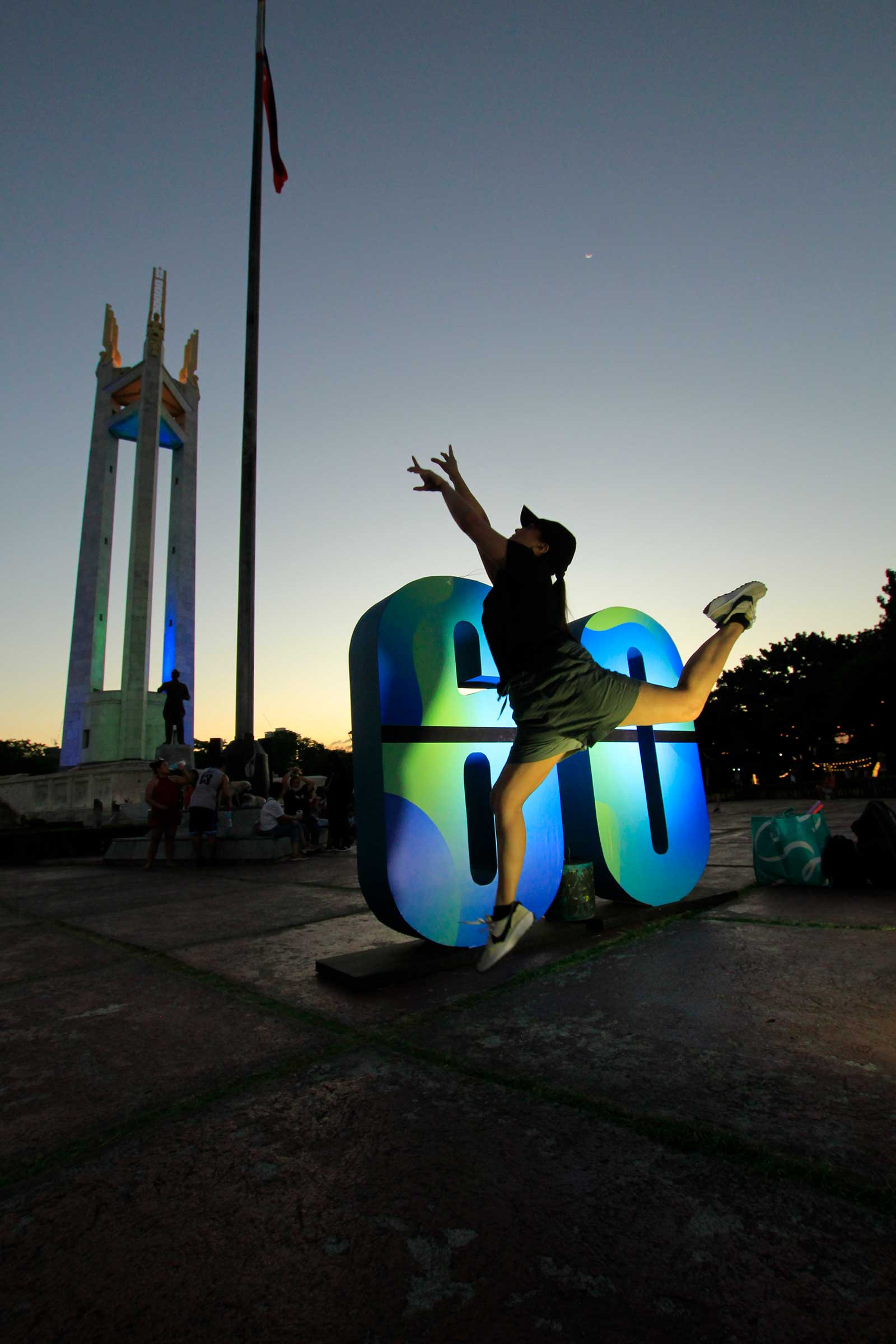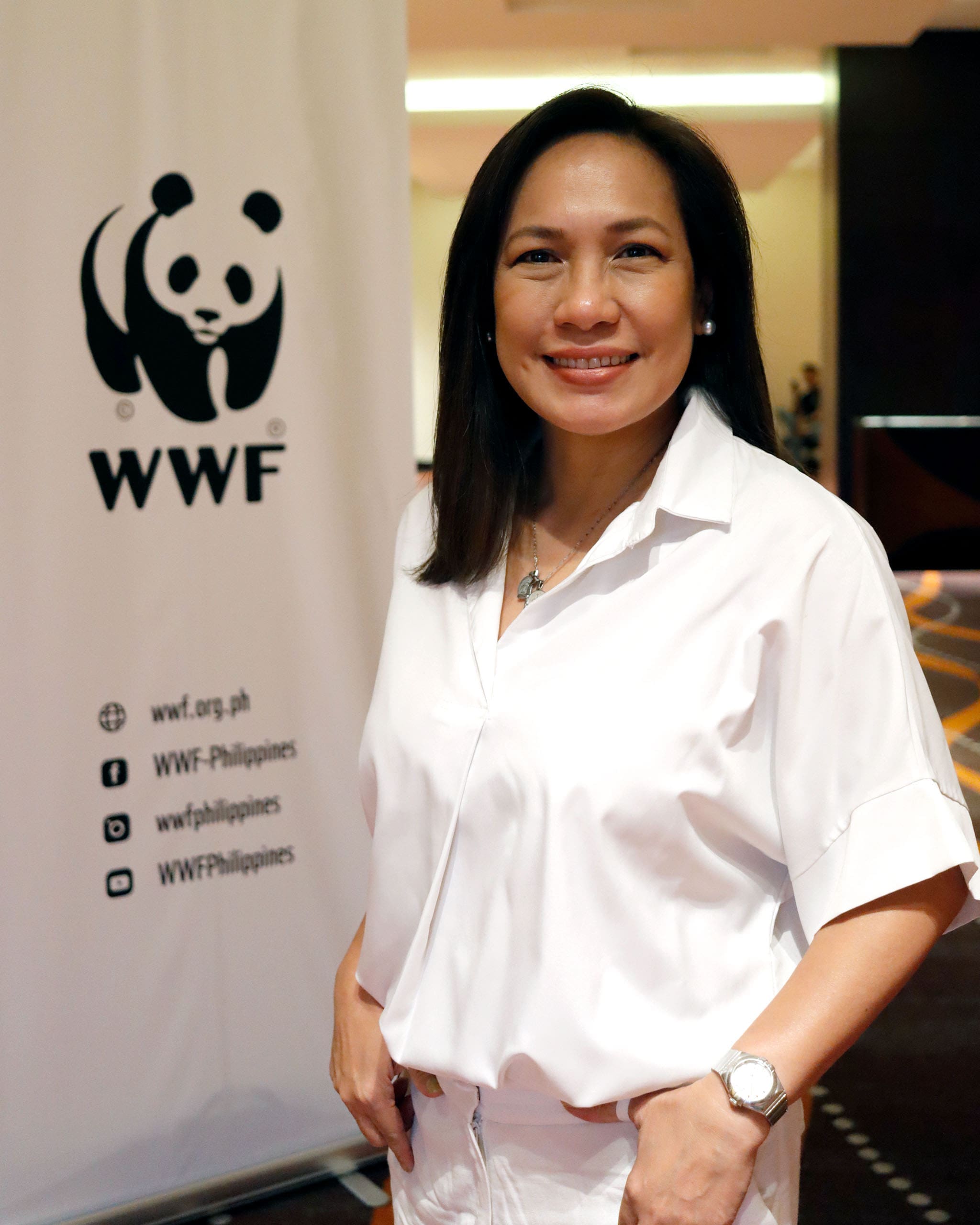Atty. Angela Ibay, Head of Climate Change and Energy Program of WWF Philippines. Courtesy of WWF
Vogue Philippines celebrates International Women’s Day through “Raising Hope,” in a call for nominations of inspiring women. Discover why Atty. Angela Ibay, Head of Climate Change and Energy Program of WWF Philippines, is encouraging Filipinos to turn off the lights for Earth Hour.
On March 23 at 8:30 pm, millions of people around the world will turn off their lights in support of Earth Hour, the annual lights-out event that began in Sydney in 2007 when the world witnessed the Sydney Opera House and Harbour Bridge go dark. The Philippines joined the movement in 2008 and has since been part of the celebrations worldwide. According to the Department of Energy, the Philippines saved 62.69 MW of power during last year’s event. But Earth Hour is not about energy reduction, and this may be where some of the confusion and cynicism about the activity lies. Some people may think that this token hour of conservation does not make up for the overconsumption happening at all other times, so why bother? I know that I dutifully turned off the lights and sat around in the dark for the first few years; I don’t remember what I did or where I was last year. But now, as the Philippines enters its 16th year with Earth Hour and the planet is on the precipice of climate chaos, maybe it’s time to revisit these 60 minutes.
Earth Hour is a symbolic action. It is “an initiative to encourage individuals, businesses and governments around the world to take accountability for their ecological footprint and engage in dialogue and resource exchange that provides real solutions to our environmental challenges,” as it says on the Earth Hour website. Over the years, Earth Hour campaigns had led to decisive action and legislative change—creating a national park in Malaysia, fighting deforestation in Uganda, the protection of 5 million sq. km of marine waters in French Polynesia, among others. In 2023, following the COP15 landmark agreement to protect and restore nature by 2030, Earth Hour refreshed its brand by launching the Biggest Hour For Earth. In addition to switching off non-essential lights, it asks you to pledge an hour to do something positive for the planet. This can be a hike through the woods, preparing a plant-based meal, or crafting an upcycled product.
Ahead of Earth Hour 2024, we spoke to Atty. Angela Ibay, Head of Climate Change and Energy Program of WWF Philippines. As national director of Earth Hour in the Philippines since 2010, she shares why switching off is more important than ever.

Atty. Ibay, what was your path to becoming an environmental lawyer?
I started off right after law school. I was fortunate that one of my professors was appointed Undersecretary for the Environment under the Department of Environment and Natural Resources, and he was looking for young lawyers to work with on the environment. But even before I joined law school, there was a question in the interview that asked what field I wanted to practice, and I did say environmental law. I felt it really spoke to me, working for the environment and being able to do something that can be a bigger cause than just corporate law or even criminal law.
Growing up, was there a moment that made you think about saving the environment, something that made you feel this is what you want to fight for?
Well, I think it was a lot of things. I was fortunate to grow up loving the beach—every summer we would go back to my hometown where I was born, Cebu. And I also enjoyed going to the farm. That was my introduction to how nature is such a beautiful thing and that we should preserve it. I didn’t plan to go to law school, I just happened to have a relative who was a court of appeals justice, she in fact encouraged me to take up the exam for law school. And I said okay, why not? But my love for the environment, which I think was fostered from a young age because of the exposure I had of not just living in the city, but actually going to places where you see nature and ensuring concern for keeping it the way it is or trying to make it better.
Is there anything new or different to Earth Hour this year?
Earth Hour has really transformed through the years from that symbolic lights off in 2007 into this big global movement which is bringing people together to work on climate action and sustainability. We try to shine the light on pressing issues that include climate change and biodiversity loss. This year in the Philippines we’re shining the light on the challenge of plastic pollution, because the Philippines has been unfortunately called out to be one of the countries that produces a lot of plastic pollution. We want to raise awareness for people to understand that real change is in our hands. And the beauty of Earth Hour is that we are able to use the platform to call on governments, businesses, and communities to really work together for a sustainable future.
So how can people use this Earth Hour in a better way instead of just turning off the lights? How can it have that lasting impact where people will take concrete action?
That’s something we always get asked on a yearly basis. How can people really go beyond the hour, beyond the switch off, and there are different levels. For one, we engage with the government to have legal policies and frameworks that enable good environmental practices to really be sustained and mainstream. But there’s also working at the community level, and that’s where we encourage small things that individuals can do. And we want to be able to reinforce that and also provide more solutions. Of course, consistency is something that we strive for, so it’s also making those reminders.
What are some of these small steps that we can do? I know everyone wants to reduce their plastic waste, but sometimes it’s just overwhelming.
At the household level, you can start with segregating your waste. I know it can get tedious but it takes just practice and it will take time to separate different types of recyclable plastic. We have also used Earth Hour as a platform to educate people about different uses of energy and the benefits of having more renewables. We focus on things that people can do simply on a day to day basis, then extend that to other things such as the use of water. For example, teaching people that water does not just come out of a tap automatically. It’s actually signaling a pump somewhere from your water service to pump water to your house, and that includes energy. So people begin to realize that the simple act of turning off the faucet can help contribute to the reduction of harmful emissions or pollution.
How about on the national or government level? Has there been any kind of progress with environmental laws?
We have a lot of good environmental laws actually, it’s really the implementation that we have to ensure that happens. The main one that has come up is the Extended Producer Responsibility Law, which covers the work that we’re doing on plastics, in reducing the kinds of plastics and ensuring that what can be recycled gets back to the producers themselves so that they can recycle properly and we move towards a circular economy. We have other frameworks which are also continually being improved, for example, the Renewable Energy Law, which only got to be implemented in the last 10 years after all the mechanisms were put in place. So there are growth pains when we talk about implementing all of these environmental laws, but we also need to be constantly challenging our government to implement these laws in a proper way and ensuring that the various stakeholders comply.
It’s also still Women’s Month, so I’d like to know about the programs that are helping empower women.
The WWF has a big initiative called No Plastics In Nature, and we know that many of the women are the ones who pick the garbage. We’ve been able to train them for alternative livelihoods. Similarly, we’re working with the fisherfolk associations, which are actually run by the women and we’re helping them develop business plans for alternative livelihoods. We always try to endeavor with our programs to balance who gets to be capacitated as well as try to lift up those, especially the women, who show leadership qualities.
For this Earth Hour, what will you be doing during the hour of darkness?
I will be at the main switch off which will be at the Kartilya ng Katipunan in the City of Manila. There will be a live music program before the switch off and also a sustainable solutions fair which will include our partner social enterprises and other environmental NGOs. I’m also planning to do the Earth Hour Virtual Run so that I can log in my hours of running for the Hour Bank, but on the night itself, I will be at the switch off.
